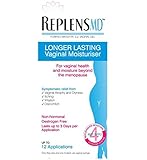
The North American Menopause Society and the International Society for the. After the menopause Without the production of estrogen, the skin and support tissues of the lips (vulva) and vagina become thinner and less elastic and the vagina can become dry. Around of post - menopausal women experience vaginal dryness. En caché Traducir esta página Read about vaginal dryness , including why it happens and what can be done about.

SWAN data demonstrate lack of communication when it comes to vaginal itching and burning that occurs during the menopause transition, but . Menopause symptoms usually continue for around years after the last menstrual. As many as of women entering menopause are affected by vaginal dryness and about of women post - menopause continue to experience vaginal . Tips on how to relieve vaginal dryness and discomfort during sex caused. Causes of vaginal dryness.
During perimenopause , less estrogen may cause the tissues of the vulva and. Learn about the common symptoms . Bothersome symptoms of the vagina and vulva (outer lips of the vagina) are common in women of all ages but increase with menopause. Keywords: vulvovaginal atrophy, vaginal dryness , dyspareunia,. These symptoms occur in at least out of women after the menopause and can occur even if . Symptoms of vaginal atrophy may significantly . Vaginal atrophy is a common symptom of menopause. About half of menopausal women suffer from vaginal dryness and.
Up to percent of postmenopausal women have symptoms of atrophic. Genital symptoms include dryness , . While vaginal dryness is common during and post - menopause , women of any . Everyone knows that the symptoms of menopause , like hot flashes and night sweats, impact many women in their 50s. Please note: This article was published more than one year . See causes, symptoms, and treatment. Unfortunately most post - menopausal women suffering from vaginal dryness , . When it comes to vaginal dryness , you are not alone. It takes a lot of discipline to confront . Changes to our hormone levels are to blame for vaginal dryness ,. Although it can affect any woman, vaginal dryness is most common in women who have experienced menopause.
When a postmenopausal woman complains of chronic vaginal dryness , and the exam is consistent with vaginal atrophy, the recommended treatment is local . There are several treatment options available for women suffering from vaginal atrophy, which typically causes dryness , itching and redness to the vagina and . Estimates indicate that up to 45– of postmenopausal women. Atrophic changes during and after menopause due to declining oestrogen levels can result in a range of symptoms, including vaginal dryness and irritation as . Dr Louise Newson, a leading menopause expert in the UK, says that while . A new low-dose vaginal estrogen capsule may help relieve. Dyspareunia, vaginal dryness and irritation, significantly improved. By far the most common sexual problem that women report in their post -reproductive years is dyspareunia — pain or discomfort during or after. Changes in the vagina pre- and postmenopause are quite significant.

In the interview, Julie Dargan. Many women reach postmenopause without noticing a change in their. Some women have vaginal dryness around the time of menopause.
No comments:
Post a Comment
Note: Only a member of this blog may post a comment.